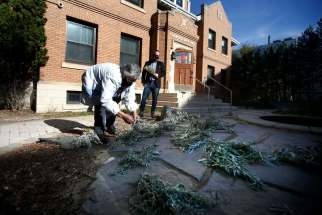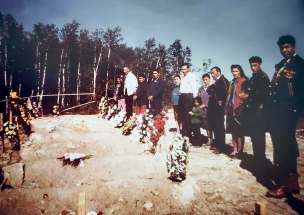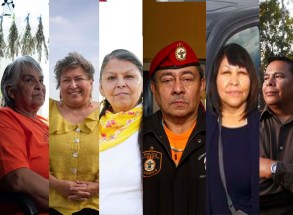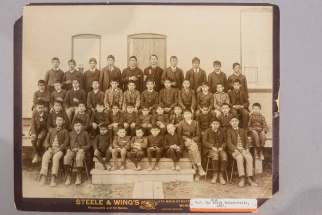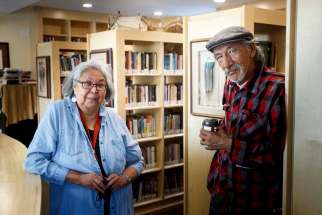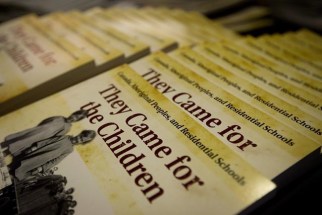Winnipeg friendship centre restoration steps forward
Read this article for free:
or
Already have an account? Log in here »
To continue reading, please subscribe:
Monthly Digital Subscription
$0 for the first 4 weeks*
- Enjoy unlimited reading on winnipegfreepress.com
- Read the E-Edition, our digital replica newspaper
- Access News Break, our award-winning app
- Play interactive puzzles
*No charge for 4 weeks then price increases to the regular rate of $19.00 plus GST every four weeks. Offer available to new and qualified returning subscribers only. Cancel any time.
Monthly Digital Subscription
$4.75/week*
- Enjoy unlimited reading on winnipegfreepress.com
- Read the E-Edition, our digital replica newspaper
- Access News Break, our award-winning app
- Play interactive puzzles
*Billed as $19 plus GST every four weeks. Cancel any time.
To continue reading, please subscribe:
Add Free Press access to your Brandon Sun subscription for only an additional
$1 for the first 4 weeks*
*Your next subscription payment will increase by $1.00 and you will be charged $16.99 plus GST for four weeks. After four weeks, your payment will increase to $23.99 plus GST every four weeks.
Read unlimited articles for free today:
or
Already have an account? Log in here »
Hey there, time traveller!
This article was published 29/09/2021 (1531 days ago), so information in it may no longer be current.
It’s not a resurrection, because the spirit never left.
“We’re calling it a reclamation and restoration,” Rachel Sansregret says.
Sansregret is Métis and the new chief executive officer of the Winnipeg Indigenous Friendship Centre Inc., an alliance of Indigenous leaders and grassroots activists seeking to bring back one of the most important community organizations in city history.
“The Winnipeg Indian and Métis Friendship Centre in many ways encompasses the story of this place,” Sansregret says. “There’s been a huge gap in our community, but it’s a place we’ve never forgotten.”
After financial mismanagement, board upheaval, and poverty in the nearby neighbourhood swallowed up the friendship centre in 2018, the doors were closed and its home at 45 Robinson St. seized, alongside its remaining assets, ending a nearly 60-year legacy in Winnipeg.
As Canada marks the National Day of Truth and Reconciliation, it’s critical to reflect on the centre’s role for urban Indigenous peoples’ lives.
Since 1959, it was one of the only safe places Indigenous people could go for assistance, whether it was First Nations citizens needing help to transition to urban life or Métis and non-status peoples accessing employment or housing programs.
National Day for Truth and Reconciliation events
Fox Lake Cree Nation walk
When: 10 a.m. – 11:30 a.m.
Where: Walkers will leave from Victoria Inn and walk to the legislature
Organized by Fox Lake Cree Nation
A group of survivors, leaders and youth from Fox Lake, York Factory First Nation and Tatasweyak Cree Nation left Gillam on Sept. 18 and arrived in Winnipeg Wednesday. They will finish their walk to the legislature Thursday. Elders, residential school survivors, counsellors and First Nations leadership will be in attendance.
Every Child Matters Youth Event
When: 10:30 a.m. – 1 p.m.
Where: Gathering place for Truth and Reconciliation at 445 King St.
Organized by Ma Mawi Wi Chi Itata
The ceremony will launch the Every Child Matters memorial art project. It will include teachings by a community elder, youth presenters, discussions of the memorial art project, and will conclude with burning of the tobacco ties and a feast.
Orange Shirt Day Healing Walk
When: 11 a.m. – 12:30 p.m.
Where: The walk will begin at the Canadian Museum for Human Rights, and will end at St. John’s Park
Organized by the 60s Scoop Legacy of Canada (Manitoba chapter)
The healing walk will honour survivors of residential schools, day schools and the Sixties Scoop, along with their families. Participants will walk from the museum to St. John’s Park on Main Street, where a powwow will take place. Rattles, drummers, and dancers are welcome; public health orders must be observed.
Every Child Matters Powwow
When: 1 p.m.
Where: St. John’s Park
Organized by Wa-Say Healing Centre
A pipe ceremony and lighting of the sacred fire will begin at 12 p.m., with grand entry at 1 p.m. The powwow will include honour ceremonies for Sixties Scoop, residential school and day school survivors, as well as a MMIW Memorial Ceremony for Gary McLean and Ted Fontaine.
Day of Survivor Stories and Discussion
When: 11:30 a.m. – 4:30 p.m.
Where: Winnipeg Art Gallery
Organized by WAG-Qaumajuq
In partnership with the National Centre for Truth and Reconciliation, the WAG will host residential school survivors Betty Ross and Marlene Gallagher to share their experiences with the public. Stories will be followed by a panel discussion with University of Manitoba historian Sean Carleton. (Admission fees will be donated to the National Centre for Truth and Reconciliation; no cost for Indigenous peoples.)
Announcements
● The City of Winnipeg will close all civic offices and lower flags on all city buildings. Public transit buses will acknowledge the National Day for Truth and Reconciliation on their digital signs, and all municipal employees are encouraged to wear orange shirts to work. The Winnipeg sign will be lit up orange in commemoration for the day.
● The Canadian Museum for Human Rights will show solidarity by lighting the Israel Asper Tower of Hope orange from dusk on Sept. 29 until the morning of Oct. 1.
● Red River College will close its campuses to honour the National Day for Truth and Reconciliation. This week, the college has hosted virtual events with Indigenous speakers on Microsoft Teams, but will pause its series to observe the day.
● Universite de Saint-Boniface said it has created a new role of senior adviser for reconciliation and Indigenous education, to be filled by university secretary Debra Radi, who has a long history of involvement with Indigenous organizations and communities. The university will be closed, but will illuminate its façade orange in commemoration of Orange Shirt Day. The university’s athletic teams will sell 200 orange T-shirts, and the proceeds will be donated to the Winnipeg Aboriginal Sport Achievement Centre.
● The Bank of Montreal is donating $600,000 to Indigenous organizations across Canada, including $250,000 for the National Centre for Truth and Reconciliation at the University of Manitoba, for its Na-mi-quai-ni-mak Centre community support fund. The centre will also host a series of online talks on Youtube.
Cultural institutions, language programs, and support groups started there. Food, tea, and kindness were a daily staple. Youth, many of them for the first time, played sports, learned how to dance pow wow, and could sit and learn from elders.
The Winnipeg Indian and Métis Friendship Centre, one of the first in Canada, was a one-stop corrective for the problems the Indian Act, residential schools, and racist legacies produced.
At its peak in the 1990s, 30,000 people annually walked through its doors – and not just Indigenous people. Teachers and their students, church congregations and, of course, tens of thousands of bingo players used the centre to visit, learn, and build community.
“A friendship centre is a place of connection,” Sansregret says, “and this is why it’s needed and we are bringing it back.”
It’s perhaps needed now more than ever. Counting roughly 114,000, Winnipeg has the largest urban Indigenous population in the country. Nearly 58,000 are youth.
“The past few years has seen huge growth in poverty and, alongside it, violence, street gangs, sexual exploitation, domestic abuse and homelessness, which has only got worse during the (COVID-19) pandemic,” Sansregret says.“Instead of funding reactive institutions that create more problems, like policing and child welfare, we have to proactive. That’s where the friendship centre comes in.” — Rachel Sansregret, CEO of Winnipeg Indigenous Friendship Centre Inc.
“Instead of funding reactive institutions that create more problems, like policing and child welfare, we have to proactive. That’s where the friendship centre comes in.”
In 2019, two groups — Aboriginal Visioning for the North End and the Winnipeg Indigenous Executive Circle — were joining with representatives from the Ma Mawi Wi Chi Itata Centre to plan to breathe life back into the friendship centre.
After presenting a proposal in June 2019 to the Manitoba Association of Friendship Centres (the body that oversees such facilities in the province) their plan received unanimous approval.
“Now we have everything in place,” Sansregret says. “We just got to get the building back.”
The initiative is spearheading three phases, called: “Reclaim, Restore, and Revive.”
The first is to buy the since-condemned building and land at 45 Robinson St. and demolish it. That will cost around $1.4 million.
The next is to build a new friendship centre, which will cost just under $13 million.
The last — and most ambitious step — is to staff and build the programming necessary for the North End community and make the organization sustainable. There are also plans to build a much-needed 60-unit seniors and elders living space. The cost of this phase: $17.5 million.
That’s almost $32 million to replace an essential service the city let fall apart.“A friendship centre is a place of connection and this is why it’s needed and we are bringing it back.” — Rachel Sansregret, CEO of Winnipeg Indigenous Friendship Centre Inc.
“We’ve launched a fundraising campaign,” Sansregret says. “But we have to get moving.”
Current 45 Robinson St. owner Median Credit Union has announced it cannot continue to carry the debt of former friendship centre site and must sell — soon.
Sansregret and her group have eight months to find the funds. While they can accept donations via a partnership with Ma Mawi Wi Chi Itata, they soon will have their own taxable status.
They are, of course, appealing to all three levels of government for support and have already received guarantees of operational funding if fundraising is successful.
They are also offering opportunities for organizations to partner as tenants and reside in the new building.
The future is bright and full of potential but many question marks — and dollars — remain for the new Winnipeg Indigenous Friendship Centre.
“The spirit of this place, this community, is still here and we are working hard to help it,” Sansregret says. “I just hope others see it, too.”
niigaan.sinclair@freepress.mb.ca

Niigaan Sinclair is Anishinaabe and is a columnist at the Winnipeg Free Press.
Our newsroom depends on a growing audience of readers to power our journalism. If you are not a paid reader, please consider becoming a subscriber.
Our newsroom depends on its audience of readers to power our journalism. Thank you for your support.


